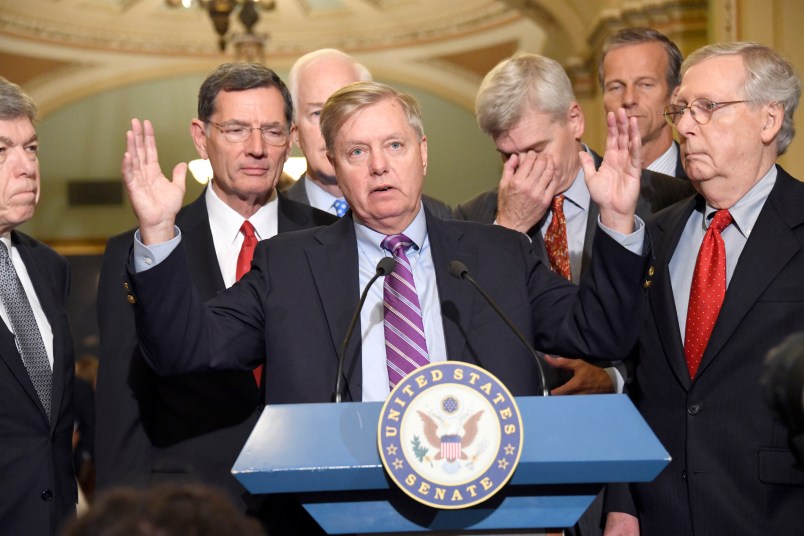The Congressional Budget Office on Monday said that the last-ditch Obamacare repeal bill Senate Republicans would result in “millions” fewer people with “comprehensive health insurance that covers high-cost medical events.”
“That number could vary widely depending on how states implemented the legislation, although the direction of the effect is clear,” the CBO said in its preliminary report of the bill, known as the Graham-Cassidy proposal, for its sponsors Sens. Bill Cassidy and Lindsey Graham.
Because the CBO was working on a tight deadline — Republicans hope to vote on the bill by the end of this week — it said it it could not provide specific numbers on the coverage losses.
“CBO and JCT would need at least several weeks to provide point estimates of the effects on the deficit, health insurance coverage, and premiums,” it said.
Nonetheless, it pointed to three main reasons that coverage would drop drastically if the Graham-Cassidy bill became law: its cuts Medicaid funding; coverage losses in the individual market because insurance subsidies would be less generous; and the elimination of the penalty for people who do not have insurance.
The report will likely to little to address the concerns hesitant GOP senators have had about the hasty process leading up to the bill or its substance. Additionally the CBO appears to have analyzed an outdated version of the proposal, and it’s not clear how tweaks made to the revised version would affect its general conclusions.
In broad strokes, the CBO paints a picture where states that have expanded Medicaid under the Affordable Care Act would be hardest hit by the Graham-Cassidy bill’s proposal to cut Obamacare’s federal funding and transform it into block grants for states.
“[M]any states that expanded eligibility for Medicaid and have particularly high levels of coverage under current law would receive the largest reductions in funding under the block grants,” CBO said. “Consequently, those states would find it particularly challenging to reach current enrollment levels using the available subsidies. Because supporting the nongroup market would be more difficult, states would probably expend less in grant funding to do so.”
But even the non-expansion states that see an additional boost in funding would face initial obstacles in lowering uninsured rates.
Those states “would spend the money slowly, CBO and JCT expect, and not be able to immediately boost coverage because they would have insufficient information technology and related infrastructure to establish their own system for administering subsidies,” according to the report.
The CBO report says that the Graham-Cassidy bill’s $1 trillion cut to Medicaid is largely the result of its repeal of the expanded program. However, its transformation of the traditional Medicaid program in a per capita cap system — where the federal government caps the amount of funding it will provide on a per enrollee basis — will likely affect the coverage that traditional Medicaid enrollees receive. To stay under the caps, which will grow more slowly than the cost of Medicaid over time, the CBO suggested that states might reduce covered services or impose cost-sharing, or that they would put a squeeze on providers causing some providers to drop out of the network entirely.
As for the individual health insurance market, the CBO took a broad look at the opportunity the Graham-Cassidy bill gives to states to rewrite or eliminate certain Obamacare insurer mandates. If they keep the mandates, states may see a death spiral situation the CBO said unless they institute their own requirement that their residents have health insurance — as Graham-Cassidy repeals the individual mandate — and/or make up for shortfall in federal funding for tax credits that would come with Graham-Cassidy proposal.
Other states may choose to opt out of Obamacare’s insurer mandates, but they too may face challenges creating a stable insurance market by 2020, when the ACA’s subsidies dry up and it block grant formula kicks in.
“[T]he transitions starting in 2020 would be difficult—and some areas would probably have no insurers offering policies in the nongroup market until the new market rules were clear and insurers had enough time to adapt to them,” the CBO said.
Even when those modifications were successfully made, the CBO noted that “coverage for people with preexisting conditions would be much more expensive in some of those states than under current law.”







It’s always been millions, Why is this less definitive? Perhaps the bigly unrealistic time crunch imposed by Yertle, Miss Lindsey, Bitch Cassidy, and their reptilian cohorts?
Millions you say? GOP cheers erupt. Confetti flies. Balloons fall. Hands are clutched to strerna. It was a great day.
This dog ain’t gonna hunt!
Feature, not a bug
That was the point. Hide the negative effects behind uncertain “decisions” by states, when the plan is to give them a lot less money to split among competing constituencies, but hurting blue states a lot more than red states. (Then they use that to try to flip blue states to red!!) In effect, there’s no decision to be made since they cut so much money out of the pie.
The public won’t be fooled, except those that don’t care and just want an R “win” and hate Obama and Obamacare because it’s named after the hated Obama. (BTW – They named it after Obama to generate just that effect.) But reasonable people know that the result of this bill, if it became law, is suffering, bankruptcy and death, all gleefully endorsed by Trump and the Rs just to claim a win and some tax cuts.